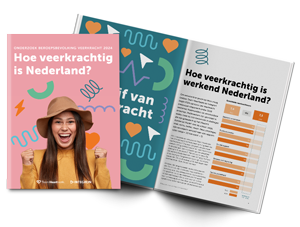The survey shows that, on average, employees recognize themselves “sometimes” to “often” in resilience statements such as “I eat healthy” or “I do things I believe in” or “My work makes me happy. “The aim is that working people in the Netherlands ‘often’ to ‘always’ recognize themselves in the statements. Hence the desired score is somewhere between a 7.8 and 10. The higher the score, the more resilient, so the better,” said Arjen Maliepaard of Integron. Resilience is determined by five elements. Also called the “Five of Resilience. These are: the degree to which people experience meaning in life , positive emotions and social support. And the way they handle adversity and their physical condition. “Especially the resilience around physical condition scores somewhat less: a 7.1. So there is work to be done there,” Arjen Maliepaard continued.
Facility services least resilient industry
With an average resilience score of 7.6, construction and education are the most resilient industries. Facility services scored the lowest of all industries, having to settle for an average rating of 7.0. The industry scores lower on all five resilience elements. Especially in terms of physical condition and positive emotions. Work makes employees relatively less happy, they eat less healthy and do not sleep and relax enough.
Differences between generations: boomers most resilient
Within organizations themselves, there are also differences. Especially between the oldest and youngest generation. Boomers (born between 1945 and 1960) are by far the most resilient. This is reflected in an average resilience score of 7.7. They have a strong social safety net, remain calm during crises, find work more meaningful and relax more. In contrast, the youngest generation (Generation Z) is less successful, with an average score of 7.2. Finding rest is quite a challenge for them. It is also more difficult for this generation to dare to make mistakes. Furthermore, the study shows that generations Z and Y feel inadequately supported by their employers when it comes to their physical and mental health. Arjen Maliepaard: “Providing social support in the workplace would therefore have a positive effect on the resilience of these generations.”
Enthusiasm and resilience go hand in hand
Resilient employees make resilient organizations. And vice versa. The better organizations can deal with change or setbacks the faster and easier they can adjust and move forward. Another success formula of organizations lies with enthusiastic employees. These experience less workload, are sick less often and recommend their organization to others. This is reflected in the employee Net Promoter Score (eNPS). Promoters are the most enthusiastic, and there is also the immediate link to resilience. Indeed, promoters are a lot more resilient at 7.9 than passives (7.4) and detractors (“non-recommenders”) at 6.5.
Insight important
“It is clear that resilience can bring many wonderful benefits to organizations and that is not just the responsibility of the individual. So it is important to understand resilience within your organization through research, set goals and know where you want to go with your organization and monitor for progress and make adjustments as needed.” Roughly 50% of the degree of resilience a person possesses is innate and only 10% depends on the circumstances a person is in. “Good news: the other 40 percent can be learned. Resilience is like a muscle you can train,” said Arjen Maliepaard.
About the study
Integron and Team Heartbeats conducted the resilience survey in January 2023 among 5,100 working Dutch people from various industries. Employees were asked to what extent they identify with statements based on the Mason’s Resilience Model using the scale: always, often, sometimes, rarely, never. These experiences were then translated into a report grade (always = 10 to never = 1).
At a time when the job market is constantly evolving and competition for talent is high, a well-structured onboarding process plays a crucial role in attracting and retaining valuable employees. In this article, we dive into why thoughtful onboarding is crucial, what it entails and some strategies to achieve an optimal onboarding experience.
Measuring customer satisfaction is invaluable in today's competitive marketplace. Customer satisfaction surveys (KTO) provide organizations with insight into their customers' expectations and experiences. This is essential for improving customer loyalty. Integron supports companies in conducting these surveys. Thus, we not only provide valuable data but also develop complete strategies to strengthen their customer relationships. In this blog, we explain why a KTO is a strategic tool for improving your services and creating satisfied and loyal customers.
The industry continues to do well. Also in the past year, the industry was overwhelmingly on the right side of the line and, along with wholesale, has the most loyal and enthusiastic customers in B2B Netherlands.




